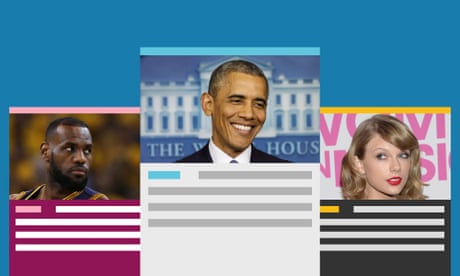The truth is rushing out there: why conspiracy theories spread faster than ever
Posted by Lou on January 2, 2016Posted in: Conspiracy theory. Leave a comment
From 9/11 to the Paris attacks, from Ebola to Isis, every major global event attracts a corresponding counter-narrative from the ‘truthers’, some so all-encompassing that they take over people’s lives. Are our brains wired to believe? And could such thinking actually be beneficial?
Source: The truth is rushing out there: why conspiracy theories spread faster than ever | World news | The Guardian
http://www.theguardian.com
David Shariatmadari
26 December 2015

‘Even if people have just a little seed of doubt about an official story, it’s very easy to go online and find other people who feel the same’ … the internet age has vastly accelerated the spread of conspiracy theories
“I remember reading about Final Fantasy VII, a movie I was really looking forward to. My initial reaction was disappointment that it was two years away – because by then we’d be under military control.” It was 2004, and Matthew Elliott was in deep. Elliott, from San Antonio, Texas, had first been drawn to conspiracy theories when he was 19, in the aftermath of 9/11. “It seemed unfathomable that we could be attacked,” he says today. In his quest to make sense of what had happened he came across the notorious “truther” movement, a current of opinion that lays blame for the atrocities at the door of the US government.

Science Weekly Why are conspiracy theories so attractive? Podcast
Should we distrust our own ability to reason? Why is debunking conspiracy theories such a risky business? And is David Icke a force for good?
“The way most conspiracy theories are laid out, one thing always leads to another, so from there I became convinced that a ruling group called the New World Order orchestrated everything. This would all lead to martial law and a complete removal of our freedoms,” he says. A decade later, Elliott, now 34, is a “recovering” conspiracy theorist, having turned his back on a worldview that always posits some covert, powerful force acting against the interests of ordinary people. The change came gradually, but he thinks very differently now. “You can’t even get many of the 50 states to agree on things. Good luck convincing Europeans and Asians to get on board.”
Elliott’s reaction to the trauma of 9/11 was far from unusual. The attacks were so unprecedented, so devastating, that many of us struggled to make sense of them. Early reports were confused or contradictory: as a result some treated the official version of events with scepticism. A proportion of those in turn plumped for an explanation that would require fakery and coordination on a massive scale.
This shouldn’t surprise us: it’s a pattern that is repeated after every global shock, and in the aftermath of the Paris attacks, it has reared its head again. Within a day of the terrorist attacks on the French capital, blogs had been published arguing that they were the work of the government – a so-called “false flag” operation. The claims rest on the idea that Isis is the deliberate creation of western governments. More recently, the lawyer for the family of Syed Farook, one of the San Bernardino shooters, fuelled conspiratorial speculation when he said: “There’s a lot of motivation at this time to emphasise or create incidents that will cause gun control or prejudice or hatred towards the Muslim community.”
The internet speeds everything up, allowing conspiracy-minded individuals to connect and formulate their ideas
Viren Swami
Round-the-clock coverage of global events means there is a constant supply of crisis and chaos for us to interpret. Stories of strings being pulled by hidden hands are a staple of our entertainment, from Spectre’s Blofeld to the baroque conspiracy of London Spy, one of the most acclaimed British dramas of the year, which unravelled in a spectacular example of the paranoid style. It’s not that belief in conspiracy theories is becoming more widespread, says Viren Swami, professor of social psychology at Anglia Ruskin university: while the research hasn’t been done yet, he tells me, there’s lots of anecdotal evidence to suggest that belief in conspiracies has remained fairly stable for the last half-century or so. What has changed, however, is the speed with which new theories are formed. “It’s a symptom of a much more integrated world,” he says. The internet speeds everything up, allowing conspiracy-minded individuals to connect and formulate their ideas. In contrast, it took months for theories about Pearl Harbor to develop.

The stories you need to read, in one handy email
Continue reading:
The truth is rushing out there: why conspiracy theories spread faster than ever | World news | The Guardian
Thanks to: https://talesfromtheloublog.wordpress.com






 Sat Mar 23, 2024 11:33 pm by globalturbo
Sat Mar 23, 2024 11:33 pm by globalturbo

